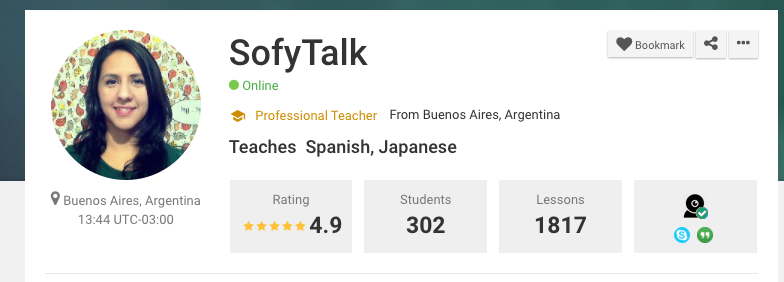Do you know about italki? If you do you know it is a great way to connect with speakers of the language that you are learning. We learn languages by understanding (Krashen) and build our skills through practice. Communicating in the target language provides the perfect opportunity to get the input we need to understand and build vocabulary and learn grammar in context. It also offers the opportunity to practice and continually test yourself, leading you to fill in the gaps of any language you don’t know.
In addition to the opportunity to connect with native speakers all over the world that italki can provide, there are many perks. The teachers on italki can provide exactly what learners at any level need. Beginners, especially, need input from someone who is sympathetic. They need someone who is willing to speak very clearly to them so that they understand this new target language. It is from this understanding that we learn languages. As a learner, it isn’t always easy to have the confidence to speak to native speakers. You will make errors. It can take a lot of time to express yourself. It can be embarrassing and uncomfortable.
My Harvard-educated attorney uncle who speaks/practices law in Spanish, once told me years ago that the best way to learn any language is to go to a bar, have a beer or two, and talk to people. That may not be an option for many independent language learners living all over the globe, and it certainly is not an option for minors, but the basic concept holds true here. We can connect with people and speak their language in a comfortable, non-threatening environment. iTalki exists for that very purpose.
I have always loved having guest speakers in my language classes. While I can provide them a great deal of authentic input from a variety of resources, talking to people other than myself or their classmates is something that needs to happen as often as possible to keep developing fluency. I love having live guests come speak to my students. However, this isn’t always possible. italki makes this possible when someone can’t physically come to a class.
The first step is setting up an account at italki. There are teachers from all over the world teaching many languages. They will ask you a few questions about your goals, native language, etc. After answering the questions and confirming my email, I was able to start searching for a teacher. The teacher profiles have ratings, information on rates and testimonials. Here is a teacher from Argentina that I worked with:
There will be a section on the teacher’s page where they will talk about how they deliver lessons. This teacher can give lessons via FaceTime, Skype or Google Hangouts.
Before the interview, the students should prepare by researching and writing questions. As this teacher is from Argentina, we will focus on some cultural questions specific to her country after we get a bit of biographical information from her. I love to use Google Docs to do this part of the project. There is a lot of accountability in doing this collaboratively and making the preparation part of the grade. Students can be responsible for creating their own questions, doing research and correcting/editing one another’s content before the lesson. You will get to see all of their work before they actually conduct the interview. You can focus on accuracy and not duplicating questions this way as well. Here is a post on using Google Apps in the language classroom for a bit more information on collaborative Google Docs:
Google Apps in the Language Classroom
I think one of the things I love the most about this is that you can record the interview on Skype or Google Hangouts. Any student who was absent can listen to the interview again and answer some questions. You can also create a great listening and writing test from it as well. The recording serves as a great follow-up tool to the guest speaker “visit”, as well as a great assessment.
Do you have guest speakers in your class? How do you structure their visits?
